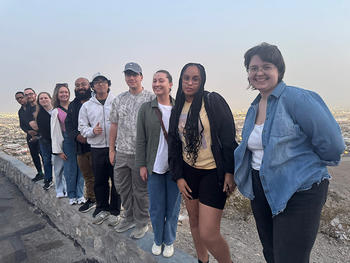
For their March 2025 spring break, eight members of the International Relations Policy Task Force (IRTF) at George Mason University's Schar School of Policy and Government and one Global Affairs student, along with Associate Professor Eric McGlinchey and Assistant Director of Student Engagement Emilee Duffy, traveled to the United States-Mexico border for a firsthand look at immigration issues and the challenges facing those living and working in the area.

Abara, a nonprofit organization based in El Paso, Texas, dedicated to fostering peace through educational programs around immigration and border realities, hosted the students for the weeklong study-abroad trip, which is also a 1-credit course.
The packed agenda mixed discussions about migration root causes, historic and current border realities, and dignified storytelling and ethical volunteerism with visits to the border fence, a migrant shelter run by Abara, and the Universidad Autónoma de Ciudad Juárez across a bridge in Mexico. There, Schar School students engaged in conversation with their peers in the Department of Social Sciences and bonded over their similar tastes in music. IRTF students also toured Ciudad Neuva, a nonprofit committed to advancing the renewal and development of central El Paso’s Rio Grande neighborhood before departing for White Sands National Park.
For Sarah Elpers, a junior government and international politics and geology double major, the trip clarified that some concepts benefit from an in-person learning experience.

“The articles we read are incredibly well written and informative, but they certainly paint a picture in your mind that isn’t always true,” she said. “This trip taught me that many Americans perceive the border as very dangerous and the bane of the country. In reality, however, it’s just another part of people’s lives. It’s very easy to believe what certain media puts out but being able to actually see what the border and immigration process is like puts things in perspective.”
Hakeem Osman, a junior government and international politics major, said the expedition helped him better understand immigration and policy as it pertains to people on both sides of the border. A high point for him was the visit to the migrant shelter, where he and his colleagues shared a meal with people in the process of migrating and learned more about their stories.
“This moment was impactful for me because it really highlighted the way that media narratives and reality often diverge,” he said. “Throughout the week we explored many heavy themes but we also found joy and friendship in these solemn moments. If you’re in the policy sphere I encourage you to take a step back and question the narratives shaping your perception of migrants and the immigration process. Narrative precedes policy and as policymakers it is imperative to remember that the policies you make affect real people.”
At the end of the week, students left with a broader viewpoint on the border crisis, one that may have differed from the one they arrived with.
Related Stories
- July 2, 2025
- June 24, 2025
- June 18, 2025
- June 18, 2025
- June 16, 2025
